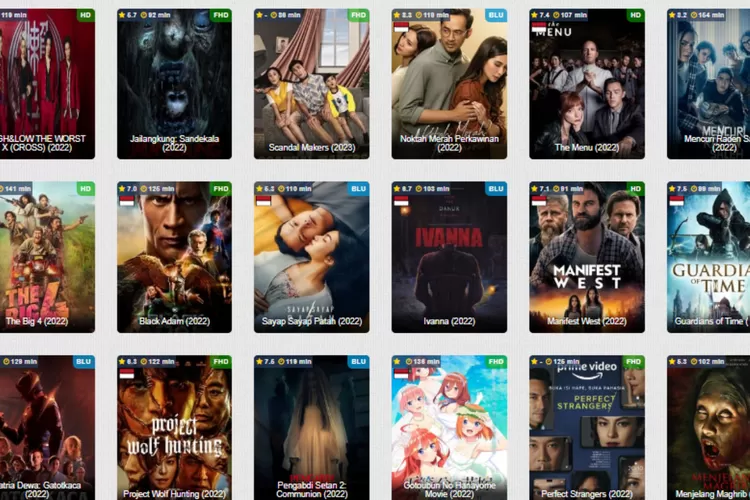Introduction
In the age of digital streaming, the convenience and accessibility of online platforms have revolutionized how we consume media. From movies and TV series to live events and music, legitimate streaming services like Netflix, Disney+, and Spotify dominate the landscape. However, alongside these legal services, a shadowy counterpart exists: illegal streaming platforms. Among them, “Rebahin” has gained notoriety. This article delves into the world of Rebahin streaming, exploring its appeal, the legal and ethical implications, the risks for users, and the broader impact on the entertainment industry.
What is Rebahin Streaming
Rebahin streaming is a popular illegal streaming platform known for providing free access to a vast array of copyrighted content, including the latest movies, TV shows, and sometimes even live broadcasts. Unlike legitimate services, Rebahin operates outside the law, distributing pirated content without authorization from the rightful owners. Its user-friendly interface and extensive library make it an attractive option for those looking to avoid subscription fees.
The Appeal of Rebahin Streaming
Cost-Free Access
The most obvious allure of Rebahin is its cost-free access to premium content. In a world where multiple streaming subscriptions can quickly add up to a significant monthly expense, the promise of watching the latest blockbusters and popular series for free is highly tempting.
Immediate Availability
Rebahin often provides content as soon as it is released, or even beforehand in some cases. This immediate availability is a significant draw, particularly for those who want to stay current with trending media without waiting for it to appear on legal platforms.
Wide Range of Content
Illegal streaming sites like Rebahin typically offer a broader range of content compared to individual legitimate services. Users can find movies and TV shows from multiple regions and eras, catering to diverse tastes and preferences.
Legal and Ethical Implications
Copyright Infringement
At its core, Rebahin’s operations are built on copyright infringement. By distributing content without proper licensing, the platform violates intellectual property laws. Content creators, studios, and distributors lose revenue that is rightfully theirs, undermining the financial viability of producing new content.
Economic Impact on the Entertainment Industry
The economic repercussions of illegal streaming are substantial. Piracy reduces the potential earnings from legitimate sales and subscriptions, leading to lower budgets for future productions. This financial strain can result in fewer jobs, reduced investment in creative projects, and a general decline in the quality and diversity of available content.
Ethical Considerations
Using Rebahin or similar platforms raises ethical questions. By supporting these services, users are complicit in depriving creators of fair compensation for their work. This undermines the principle of rewarding creativity and innovation, which is essential for the sustained growth of the entertainment industry.
Risks for Users
Legal Consequences
Engaging with illegal streaming sites like Rebahin carries significant legal risks. Many countries have stringent laws against copyright infringement, and users caught accessing or distributing pirated content can face hefty fines or even imprisonment. Authorities increasingly monitor and take action against both operators and users of such platforms.
Malware and Cybersecurity Threats
Illegal streaming sites are notorious for their lack of security measures. Users are often exposed to malware, phishing attacks, and other cybersecurity threats. These platforms frequently bombard visitors with intrusive ads and malicious pop-ups that can lead to data breaches and compromised personal information.
Poor Quality and Reliability
While Rebahin offers free access to content, the quality and reliability of streams are often subpar compared to legal services. Users may experience low-resolution videos, frequent buffering, and sudden removal of content. This inconsistent quality detracts from the overall viewing experience.
The Broader Impact on the Entertainment Ecosystem
Undermining Legal Platforms
Illegal streaming undermines the growth and sustainability of legal platforms. As piracy siphons off potential subscribers, legitimate services struggle to maintain profitability. This can lead to increased subscription costs, reduced content acquisition, and the eventual failure of new platforms trying to enter the market.
Cultural and Creative Consequences
The cultural impact of illegal streaming extends beyond economics. When creators and studios face financial difficulties due to piracy, it limits their ability to take risks and innovate. This results in fewer unique and diverse stories being told, ultimately reducing the cultural richness of available media.
Combating Illegal Streaming
Technological Solutions
To combat illegal streaming, technological advancements such as digital rights management (DRM) and watermarking are employed. These measures help track and prevent the unauthorized distribution of content. Additionally, streaming platforms continually enhance their security to protect their libraries from piracy.
Legal Enforcement
Governments and industry bodies are ramping up efforts to enforce copyright laws more strictly. High-profile lawsuits and coordinated takedowns of illegal streaming sites send a clear message about the consequences of engaging in piracy. International cooperation is also crucial in addressing the global nature of digital piracy.
Public Awareness and Education
Raising public awareness about the risks and consequences of illegal streaming is essential. Education campaigns can inform users about the ethical and legal implications of piracy, encouraging them to support legitimate services. Highlighting the value of fair compensation for creators fosters a culture of respect for intellectual property.
The Future of Streaming: Towards a Sustainable Model
Innovation and Accessibility
The future of streaming hinges on innovation and improved accessibility. Legal platforms must continually evolve to offer compelling features, competitive pricing, and diverse content libraries that meet the needs of a global audience. Enhanced user experiences, such as personalized recommendations and offline viewing options, can help retain subscribers.
Supporting Emerging Markets
Expanding access to legal streaming in emerging markets is crucial. Affordability and localized content are key factors in attracting subscribers in regions where piracy is prevalent. By catering to the specific needs and preferences of these audiences, legitimate services can reduce the appeal of illegal platforms.
Collaboration Across the Industry
Collaboration between content creators, distributors, and technology providers is essential for a sustainable streaming ecosystem. Joint efforts to combat piracy, invest in high-quality productions, and develop innovative distribution models will ensure the continued growth and diversity of available content.
Conclusion
Rebahin streaming, like other illegal platforms, presents a complex challenge in the digital age. While it offers short-term benefits to users, the long-term consequences for the entertainment industry and individual users are profound. By understanding the legal, ethical, and practical implications of engaging with such services, we can make informed choices that support the creators and platforms that enrich our cultural landscape. Embracing legal alternatives and fostering a culture of respect for intellectual property are vital steps towards a sustainable and vibrant future for digital media.












+ There are no comments
Add yours